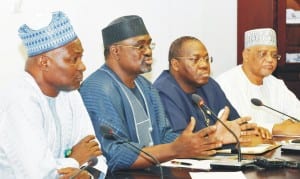Oil & Energy
NDPHC: Group Disagrees With MD’s Tenure Extension
A pressure group in
the South-South geopolitical zone, Coalition of Concerned Niger Deltans, has faulted the extention of the term of office of the Managing Director of the Niger Delta Power Holding Company (NDPHC) beyond the mandatory two terms in office.
In its open letter to the President, Dr. Goodluck Jonathan, the group described the extention as curious and unacceptable, remarking that the development would jeopardise the good intention of government in establishing the company.
The letter which was signed by the body’s Executive Secretary, Mr Godspower Amachree noted that NDPHC has some internal problems that led to the removal of some executive directors in 2014, stressing that since then the managing director has allegedly become more or less a sole administrator, running the organisation as his personal business.
“This same managing director has served his mandatory two terms in office, but curiously, at the just-concluded board meeting of the NDPHC on Friday, April 17 2015, which was chaired by Vice President Namadi Sambo, his tenure was renewed and approved, as well as tenure of four new executive directors,” it said.
It said, the decision was not only totally wrong but also an affront on the government’s efforts towards uninterrupted power supply to Nigerians.
Describing the action as suspicious, the coalition maintained that the extention would saddle the incoming administration of Gen Muhammadu Buhari with avoidable and unnecessary problems.
According to the letter to Mr. President, “tongues are wagging as to the rush in appointing new directors barely five weeks to the end of the present administration.
“Our understanding is that powerful politicians, who do not mean well to you and are not in tune with your patriotic and nationalistic stand, are behind the appointments,” the letter said.
Chris Oluoh

L-R: Director-General, Bureau of Public Enterprises, Benjamin Dikki; Minister of Mine and Steel Development, Musa Sada; Permanent Secretary, Ministry of Power, Godknows Ighali and Vice Chairman, Technical Committee, National Council on Privatization, Haruna Sambo, during a news conference after National Council on Privatisation Meeting in Abuja, recently.
Oil & Energy
NERC, OYSERC Partner To Strengthen Regulation

Oil & Energy
NLC Faults FG’s 3trn Dept Payment To GenCos

Oil & Energy
PENGASSAN Rejects Presidential EO On Oil, Gas Revenue Remittance ……… Seeks PIA Review

-
Maritime5 days ago
Nigeria To Pilot Regional Fishing Vessels Register In Gulf Of Guinea —Oyetola
-

 Sports5 days ago
Sports5 days agoGombe-Gara Rejects Chelle $130,000 monthly salary
-
Maritime5 days ago
Customs Declares War Against Narcotics Baron At Idiroko Border
-

 Sports5 days ago
Sports5 days agoTEAM RIVERS SET TO WIN 4×400 ” MORROW” …Wins Triple jump Silver
-

 Sports5 days ago
Sports5 days agoNPFL Drops To 91st In Global League Rankings
-
Maritime5 days ago
NIMASA,NAF Boost Unmanned Aerial Surveillance For Maritime Security
-

 Sports5 days ago
Sports5 days agoNIGER DELTA GAMES PANACEA TO YOUTH DEV”
-

 Sports5 days ago
Sports5 days agoNPFL Impose Fines On Kwara United Over Fans Misconduct

